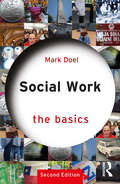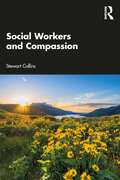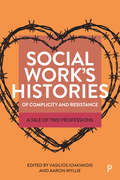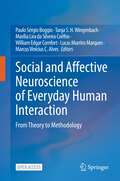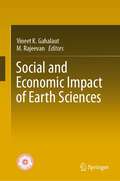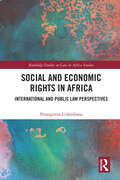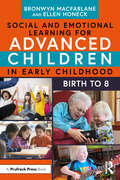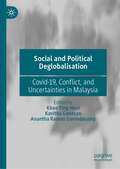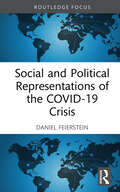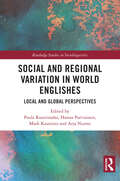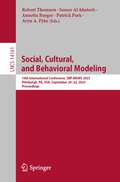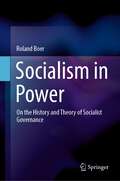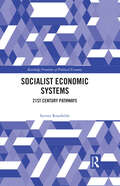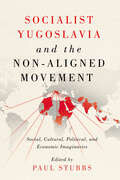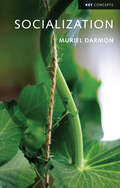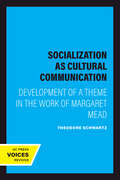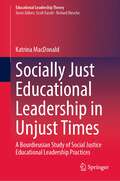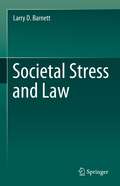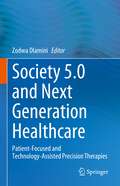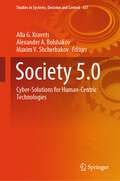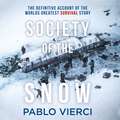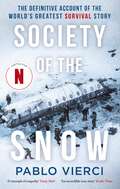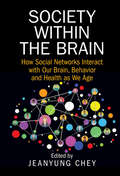- Table View
- List View
Social Work: The Basics (The Basics)
by Mark DoelThis revised second edition of Social Work: The Basics is an insightful introduction to the often misrepresented world of social work. This accessible book presents a broad view of contemporary social work, exploring its roots and its possible future. It dispels myths surrounding social work, addresses media debates, and offers a balanced account of what social workers do. Arguing for a social work that is partisan in support of social justice, questions covered include: How did social work arise? How and why do people come into contact with social workers? What are the true aims of social work – to help or to control?What is the relationship between social work and social policy?How and why do people become social workers?What’s it like to be a social worker?Can social work cross borders? Drawing examples from the full range of social work practice, this book is valuable reading for all individuals interested in the field of social work. It will provide a helpful introduction for students considering a career in social work, those beginning social work courses, and other professionals whose work brings them into contact with social workers.
Social Workers and Compassion
by Stewart CollinsSocial Workers and Compassion is designed to assist social work students, social workers, social work managers, social care workers, and lecturers in developing knowledge, understanding, skills, and values related to various aspects of compassion. Focussing on social work in the UK, the various elements of compassion – compassion, compassion fatigue, compassion satisfaction, self-care, self-compassion, and mindfulness – are clearly located in a systemic, organisational, and structural context. The chapters draw upon evidence-based and evidence-informed sources and present critical perspectives that are linked to existing practices in social work education, social work, and the author’s own experiences. Drawing upon literature from social work and health care, social, organisational, work, and positive psychology, and from sociology and social policy from various parts of the world, the book will be of interest to international social work readers as well as professionals and professionals in training in the criminal justice, health care, counselling, and clinical psychology fields. It will be essential reading for social work students, lecturers, social care workers, social workers, and their managers.
Social Work’s Histories of Complicity and Resistance: A Tale of Two Professions
by Vasilios Ioakimidis and Aaron WyllieSocial work is often presented as a benevolent and politically neutral profession, avoiding discussion about its sometimes troubling political histories. This book rethinks social work’s legacy and history of both political resistance and complicity with oppressive and punitive practices. Using a comparative approach with international case studies, the book uncovers the role of social workers in politically tense episodes of recent history, including the anti-racist struggle in the US and the impact of colonialism in Australia, New Zealand and Canada. As the de-colonisation of curricula and the Black Lives Matter movement gain momentum, this fascinating book skilfully navigates social work’s collective political past while considering its future.
Social and Affective Neuroscience of Everyday Human Interaction: From Theory to Methodology
by Paulo Sérgio Boggio Tanja S. H. Wingenbach Marília Lira da Silveira Coêlho William Edgar Comfort Lucas Murrins Marques Marcus Vinicius C. AlvesThis Open Access book presents the current state of the art knowledge on social and affective neuroscience based on empirical findings. This volume is divided into several sections first guiding the reader through important theoretical topics within affective neuroscience, social neuroscience and moral emotions, and clinical neuroscience. Each chapter addresses everyday social interactions and various aspects of social interactions from a different angle taking the reader on a diverse journey. The last section of the book is of methodological nature. Basic information is presented for the reader to learn about common methodologies used in neuroscience alongside advanced input to deepen the understanding and usability of these methods in social and affective neuroscience for more experienced readers.
Social and Economic Impact of Earth Sciences
by Vineet K. Gahalaut M. RajeevanThis book collects research papers on the economic and social impact of earth sciences. It covers topics related to weather forecasting, climate modelling, monsoon variability, air pollution, heat and cold wave, deep sea mineral and living resources, ocean state monitoring, tsunami and earthquake monitoring, desalination, coastal research, etc. The book focuses on the activities of the Ministry of Earth Sciences, India, in promoting the societal and economic impacts of earth science research in a simple language and in the form of stories and case studies, so that people with basic science degree can understand them.
Social and Economic Rights in Africa: International and Public Law Perspectives (Routledge Studies on Law in Africa)
by Nsongurua UdombanaSocial and economic rights have hitherto been marginalised in mainstream legal and political discourses and treated as second-class citizens in the human rights family. These rights are now receiving increasing attention in law and politics, arguably because they raise existential questions on human security and dignity. This one-stop volume examines the international and public law perspectives on socio-economic rights in Africa. Working on the premise that these rights are normative and justiciable, the author methodically and expertly examines the legal frameworks for their protection in global, regional, and national instruments, infusing the analysis with African and comparative jurisprudence. The author also examines the nature of obligations on these rights as well as the interpretive methodologies that should be deployed towards their realisation. In blending theory with practice, the book also reflects on some governance challenges that continue to hobble the effective realisation of these rights in Africa. The book is a seminal contribution on an important field, an ideal companion for human rights practitioners, international and constitutional lawyers, judges, government advisors, students, social workers, and everyone who desires ‘freedom from fear and want’.
Social and Emotional Learning for Advanced Children in Early Childhood: Birth to 8
by Bronwyn MacFarlane Ellen HoneckThis book illuminates the complexities of social and emotional learning (SEL) during early childhood and provides readers with supportive tools to enhance and advance social and emotional skills among young children within their homes and classrooms. Affective development is critical to childhood development – this guide gives parents and educators concrete strategies to support students’ social skills, relationship development, and positive mental health. Expertly blending theory with practice, Social and Emotional Learning for Advanced Children in Early Childhood: Birth to 8 presents vital background information, real-life examples, diverse case studies, discussion questions, and action steps for implementing SEL into any early childhood environment. By including both what is understood about social and emotional development in early childhood as well as the proven methods and approaches for working with young children, this comprehensive guide is a must read for all adults striving to make a positive impact in early childhood development.
Social and Political Deglobalisation: Covid-19, Conflict, and Uncertainties in Malaysia
by Khoo Ying Hooi Kavitha Ganesan Anantha Raman GovindasamyThis book focuses on the discourse of de-globalisation in Malaysia by looking at the implications of this process politically, economically, socially, and environmentally. The rise of right-wing political parties and a decline in global economic interdependence have rapidly fuelled the de-globalisation process by creating conflicts and uncertainties in many parts of the world. The battle against the Covid-19 pandemic has spurred a great challenge among the global community, thus becoming a catalyst in the de-globalising process worldwide. While there have been contested opinions on whether we are now in the temporary phase of de-globalisation, what is clear is that the pandemic adds momentum to the trend. Now that the world has entered the post-Covid-19 phase, is the discourse of de-globalisation still relevant? Since the emergence of this pandemic, Malaysia has been facing not only a change of government but also a rapid decline in its economy, a rise in unemployment and living costs, with the human rights situation deteriorating as the State of Emergency was imposed. All of these add up to a shift toward de-globalisation. Chapters in this book, therefore, engage with this issue from different perspectives, such as conventional warfare, bio-constitutional implications to the right to health, labour, migrants and refugees, digital education, indigenous people and so forth.
Social and Political Representations of the COVID-19 Crisis (The COVID-19 Pandemic Series)
by Daniel FeiersteinWeaving together political, sociological, psychological and epidemiological analyses, Social and Political Representations of the COVID-19 Crisis provides revealing insights into the transformations wrought by the pandemic and the social divisions it has exposed. Accounting for the realities of the pandemic across the globe, with a strong focus on experiences in the Global South, this book challenges readers to question their beliefs about the societies they live in and how these societies should respond to collective catastrophes. Originally published in Spanish, this English edition is thoroughly revised and updated. Social and Political Representations of the COVID-19 Crisis analyses the varied strategies attempted in different parts of the world to deal with the pandemic, including elimination, mitigation, flattening the curve, and herd immunity, and the ramifications of these approaches. It argues that the different strategies are guided by social representations that can be analysed on epistemological, emotional and ethical-moral levels. Drawing upon a wide range of thinkers, the book also investigates the key role of psychological defence mechanisms, including different ways of denying the seriousness of the pandemic and different paranoid responses to pain and frustration, such as scapegoating and conspiracy theories. This timely book analyses the transformations in the social fabric brought about by the pandemic and the questions it poses for the future of our societies. It will therefore be of great interest to students and researchers in the humanities, social sciences, and public health as well as the general reader.
Social and Regional Variation in World Englishes: Local and Global Perspectives (Routledge Studies in Sociolinguistics)
by Paula Rautionaho, Hanna Parviainen, Mark Kaunisto and Arja NurmiThis collection charts the evolution of grammatical variation in Englishes from Late Middle English to the present, using corpus linguistic tools to address divergence and convergence in local and global perspectives.The book considers both diachronic and synchronic perspectives in grammatical variation across varieties of English across the UK, North America, Europe, Africa, and Asia. The volume reflects on the questions of whether patterns of variation diverge or converge and to what extent catalysts for change are shared in time and space. Chapters look at different factors in grammatical variation at both the macro and micro level, investigating specific linguistic and grammatical features but also at wider phenomena in contact linguistics, social patterns, social networks, and media-based corpora. Chapters progress from the local to the global, all with an eye towards using the latest methodological approaches from corpus linguistics to shed light on the affordances of data-informed methods to study grammatical change and the possibilities for future research.This book will be of interest to students and scholars in sociolinguistics, corpus linguistics, and World Englishes.
Social, Cultural, and Behavioral Modeling: 16th International Conference, SBP-BRiMS 2023, Pittsburgh, PA, USA, September 20–22, 2023, Proceedings (Lecture Notes in Computer Science #14161)
by Robert Thomson Samer Al-Khateeb Annetta Burger Patrick Park Aryn A. PykeThis book constitutes the proceedings of the 16th International Conference on Social, Cultural, and Behavioral Modeling, SBP-BRiMS 2023, which was held in Pittsburgh, PA, USA in September 2023.The 31 full papers presented in this volume were carefully reviewed and selected from 73 submissions. The papers were organized in topical sections as follows: Detecting malign influence; human behavior modeling; and social-cyber behavior modeling.
Socialism in Power: On the History and Theory of Socialist Governance
by Roland BoerThis book examines the historical development—in practice and theory—of governance in socialist systems. With more than a century of such development from many parts of the world, including the Soviet Union, China, and the DPRK (North Korea), it is possible to gain much from careful study of their political systems.But what is the nature of this socialist governance? It is abundantly clear that the type of governance in socialist countries had never before been seen in human history. How does this governance work? What was the political theory that arose from the practice? How did this type of governance develop over time and in light of specific conditions?These are the questions that Socialism in Power sets out to answer. It does so not by using methods developed for studying Western liberal nation-states, but by deploying Marxist-Leninist analysis. Not an abstract Marxism, but concrete Marxism, as it was applied and developed in light of the particular historical conditions of the countries in question.The book begins with careful analysis of the works of Marx and Engels, with a particular emphasis on Engels, who was crucial in establishing the basic principles of socialist governance. Next, the book focuses on the Soviet Union, which was the first country in human history to experience socialism in power. The rarely studied DPRK (North Korea) comes next, as a transition to East Asia, followed by a number of chapters on China, which arguably has the most developed form of socialist governance.
Socialist Economic Systems: 21st Century Pathways (Routledge Frontiers of Political Economy)
by Steven RosefieldeBernie Sanders’ socialist advocacy in the United States, communist China’s economic successes and a Marxist revival are inspiring many to muse about improved strategies for building superior socialist futures. Socialist Economic Systems provides an objective record of socialism’s promises and performance 1820-2022, identifies a feasible path forward and provides a rigorous analytic framework for the comparison of economic systems. The book opens by surveying pre-industrial utopias from Plato to Thomas More, and libertarian communal designs for superior living. It plumbs all aspects of the revolutionary and democratic socialist political movements that emerged after 1870 and considers the comparative economic, political and social performance of the USSR and others from the Bolshevik Revolution onwards. The book also provides case studies for all revolutionary Marxist-Leninist regimes, and supplementary discussions of Mondragon cooperatives, Israeli kibbutzim, Nordic corporatism, and European democratic socialism. It investigates the theoretical and practical complexities of command-planning, reform communism, market communism, worker economic management and egalitarianism. It examines communism as an engine of economic growth, and a mechanism for improving people’s quality of existence, including living standards, labor self-governance, egalitarianism, social justice, and prevention of crimes against humanity before addressing the perennial question of what needs to be done next. A suggested path forward is elaborated drawing lessons from the warts-and-all historical performance of socialist economies 1917-2022 and failed socialist prophesy. The evidence indicates that the key to 21st century socialism success lies in empowering workers of all descriptions to govern democratically for their mutual protection and welfare without the extraneous imposition of priorities imposed by other movements. The book is essential reading for anyone interested in Socialism, political economy, comparative economic systems and political and social history.
Socialist Yugoslavia and the Non-Aligned Movement: Social, Cultural, Political, and Economic Imaginaries
by Paul StubbsAfter a summit in Belgrade in September 1961, socialist Yugoslavia, led by President Josip Broz Tito until his death in 1980, initiated a movement with states in the Global South. The Non-Aligned Movement not only offered an alternative to the Cold War polarization between NATO and the Warsaw Pact but also expressed the hopes of a world emerging from colonial domination.Socialist Yugoslavia and the Non-Aligned Movement investigates the Non-Aligned Movement both as a top-down, interstate initiative and as a site for transnational exchange in science, art and culture, architecture, education, and industry. Re-invigorating older debates by consulting newly available sources, the volume challenges studies that marginalize the role of socialist Yugoslavia in the Non-Aligned Movement. Contributors address topics such as women’s involvement, antifascism and anti-imperialism, cultural and educational exchange, tensions in Yugoslav diplomacy, competing understandings of economic development, the role of the Yugoslav construction company Energoprojekt, Yugoslav relations with Latin America and Africa, and contemporary support for refugees and asylum seekers as a kind of practical and affective afterlife of Yugoslavia’s non-aligned commitments. Socialist Yugoslavia and the Non-Aligned Movement offers an innovative approach to one of the twentieth century’s most important international movements and confronts issues of economic, social, and cultural rights that remain relevant today.
Socialization (Key Concepts)
by Muriel DarmonHow does society form and transform individuals? Sociology has been asking this question since its inception and “socialization” has been analyzed from different vantage points by various prominent thinkers. Socialization offers an overview of some of these perspectives in the classic work of key theorists and in contemporary research that has either developed or challenged these ideas. The book argues that, while socialization has sometimes been framed as an outdated, static approach, it in fact remains highly relevant and continues to provide valuable insight into how we come to act and think as we do. Drawing on a wide variety of empirical examples, the book offers a lively, accessible account of primary and secondary socialization, and how they interconnect. By considering socialization as a process that continues throughout the life course, the book highlights the dynamic and enduring ways in which the social world is involved in shaping and reshaping individuals, shedding productive light on the effects of class, gender, and race, as well as on inequality and domination. Socialization will appeal to students and scholars in sociology, as well as other disciplines such as psychology and education.
Socialization as Cultural Communication: Development of a Theme in the Work of Margaret Mead
by Theodore SchwartzMargaret Mead has had much recognition in the professional community as past president of American Anthropological Association and the American Association for the Advancement of Science. A bibliography of her works alone will fill a volume. This book develops but one central theme form her work--the processes of cultural transmission. In keeping with the interdisciplinary focus of Ethos and with the interdisciplinary relevant of Margaret Mead's work, scholars of diverse fields--anthropology, sociology, psychology, psychiatry, and primatology--were invited to contribute articles on suggested topics related to the thems of socialization as cultural communication. --From the Introduction This title is part of UC Press's Voices Revived program, which commemorates University of California Press's mission to seek out and cultivate the brightest minds and give them voice, reach, and impact. Drawing on a backlist dating to 1893, Voices Revived makes high-quality, peer-reviewed scholarship accessible once again using print-on-demand technology. This title was originally published in 1976.
Socially Just Educational Leadership in Unjust Times: A Bourdieusian Study of Social Justice Educational Leadership Practices (Educational Leadership Theory)
by Katrina MacDonaldThis book offers a richly observed study of three principals working in some of the most disadvantaged primary schools in Victoria, Australia. It explores their social justice understandings and practices in working to improve the educational outcomes for children in their schools, through autobiography, biographical interviews, in-depth interviews and observations. The work looks into their life histories, the formation of their primary and secondary habitus, and uncovers and examines their encounters with the public education field. Drawing on Pierre Bourdieu’s theory of practice and his ‘thinking tools’, the book investigates how the principals’ understandings of social justice are shaped by the intersection of their life and work histories. This book is of interest to educational leadership scholars interested in the application of critical theory to studies of leadership. The book provides an exemplar for the application of Bourdieu’s theory of practice, and it makes a strong contribution to Bourdieusian scholarship, social justice scholarship and educational leadership scholarship.
Societal Self-empowerment in Germany: A Comparison of Fridays for Future and Corona Skepticism
by Reimut Zohlnhöfer Peter Kirsch Hanno KubeMost recently, various groups have drawn attention to their political causes by demonstratively breaking the law, whether it is violating compulsory education in Fridays for Future demonstrations or refusing to abide by pandemic containment measures among critics of the Corona policy. This book explores what lies behind these rule-breaking events: supporters of the Fridays for Future movement, while dissatisfied with climate policy, are well integrated into the political system; people who may not abide by Corona rules, on the other hand, sometimes exhibit considerable alienation from and distrust of the political system.
Societal Stress and Law
by Larry D. BarnettSocietal Stress and Law draws attention to the social side effects of law by developing the sociological concept of society-level stress, a corollary of the concept of individual-level stress in the biological sciences. To encourage interest in societal stress, the book looks at (1) instances of law adopted by American states that the U.S. Supreme Court held unconstitutional and (2) actions by American states with regard to a proposal to amend the federal Constitution. The Court rulings and the proposed constitutional amendment were capable of producing societal stress because they were seen by a sizeable segment of the U.S. public as being incompatible with significant American traditions. In original studies that apply logistic regression to state-level statistical data, the book identifies sociological variables that predict state differences in the adoption of this law and state differences in actions on the proposed constitutional amendment. Because these variables represent societal agents that affected whether a state experienced social stress from the rulings and proposal, the book blends theory with empirical research and illustrates how each can support the other in law-focused scholarship.
Society 5.0 and Next Generation Healthcare: Patient-Focused and Technology-Assisted Precision Therapies
by Zodwa DlaminiThis book analyses the ability of technological advancements to represent, enhance, and empower multidisciplinarity in the context of Society 5.0. and next generation medicine. New technologies allow patients to communicate with medical personnel anytime, anywhere and shape the terrain of healthcare ecosystem at an unprecedented rate. Five main trends become apparent in this process: Hybrid care models combining virtual and in-person services, digitization of healthcare specialties, increased Artificial intelligence (AI) adoption, health systems moving to the cloud and advanced precision medicine.In its chapters the book dissects the important roles for technologies in areas such as digital twinning, big data, Internet of Things, AI, cyber-physical systems, blockchain technology to lead the healthcare digitalization envisioned in Society 5.0. Throughout the book the authors discuss how to incorporate these new technologies legally, ethically, safely, and securely and in keeping with the highest standards of human rights. It also advocates for the need for careful oversight and mindful allocation of resources and energy for sustainable development.This book, written by experts in the field from academia and industry, will appeal to researchers, healthcare professionals, policy makers, teachers and students interested in the ways healthcare is reorganized based on digital transformation efforts and the rethinking of care, including technologies.
Society 5.0: Cyber-Solutions for Human-Centric Technologies (Studies in Systems, Decision and Control #437)
by Alla G. Kravets Alexander A. Bolshakov Maxim V. ShcherbakovThis book focuses on open issues of Society 5.0, a new paradigm of a society, that balances a human-centred approach and technologies based on cyber-physical systems and artificial intelligence. The book contains results of how intelligent or cyber-solutions help to improve the quality of life in society despite new challenges. This book includes five sections. Section Society 5.0: Biomedicine and Healthcare present how cyber-physical systems help in healthcare, e.g. analysis of clinical data in pregnant women with hypertension, breast cancer diagnostics, healthy diet design and others. In the chapter, the problem of data analysis and optimization is considered. The second Section, Society 5.0: Human-centric Cyber-Solutions highlight new findings on constructing virtual reality simulators, training of workers on the basis of equipment's digital twins, development of human capital. Society 5.0: Socio-Economic Systems Modelling includes chapters concerning the application of quantum-like mathematical models for the analysis of socio-economic systems, indicative planning models for agriculture, approaches of assessing and monitoring competitiveness risks of regions. A section, Society 5.0: Industrial Cyber-Solutions provides new results on cyber-physical systems of Russian oil market, railway joint diagnostics, and information support for maintenance and repair of a machine-building cyber-physical system. The last section, Society 5.0: Cyber-Solutions Security consider interoperability issues of security, the video conferencing, and scaling networks.This book is directed to researchers, practitioners, engineers, software developers, professors and students. We do hope the book will be useful for them.
Society of the Snow: The Definitive Account of the World’s Greatest Survival Story
by Pablo VierciIt was 13 October 1972. Uruguayan Air Force Flight 571, carrying a team of young rugby players, their families and friends, took off for the very last time. A deadly miscalculation saw F571 crash directly into the Andean mountains to devastating consequences: the body of the plane broke violently into two, its floor torn to smithereens; seats flew out of the air taking passengers with them. In the weeks that followed, the remaining people who were on board - the society of the snow - emerged to fight a dire, gruelling battle for survival.Waiting for a rescue team that didn't arrive, the survivors became fewer and fewer in numbers. Stranded alone on a glacier, they had to face brutal temperatures, lethal avalanches and the loss of friends and family with no access to supplies, food or water. In order to survive, they had to do the unthinkable . . . It wasn't until seventy-two days later that they were able to reach safety.Alarmingly gritty, moving and powerfully told, journalist Pablo Vierci recounts the unsettling stories of the sixteen survivors in intimate detail. Drawing on exclusive interviews, Society of the Snow delves into the tragedy of the crash and how it radically redefined the rest of the survivors' lives. Ultimately, however, the book is a touching testament to the strength of faith, friendship, and the resilience of the human spirit.
Society of the Snow: The Definitive Account of the World’s Greatest Survival Story
by Pablo VierciIt was 13 October 1972. Uruguayan Air Force Flight 571, carrying a team of young rugby players, their families and friends, took off for the very last time. A deadly miscalculation saw F571 crash directly into the Andean mountains to devastating consequences: the body of the plane broke violently into two, its floor torn to smithereens; seats flew out of the air taking passengers with them. In the weeks that followed, the remaining people who were on board - the society of the snow - emerged to fight a dire, gruelling battle for survival.Waiting for a rescue team that didn't arrive, the survivors became fewer and fewer in numbers. Stranded alone on a glacier, they had to face brutal temperatures, lethal avalanches and the loss of friends and family with no access to supplies, food or water. In order to survive, they had to do the unthinkable . . . It wasn't until seventy-two days later that they were able to reach safety.Alarmingly gritty, moving and powerfully told, journalist Pablo Vierci recounts the unsettling stories of the sixteen survivors in intimate detail. Drawing on exclusive interviews, Society of the Snow delves into the tragedy of the crash and how it radically redefined the rest of the survivors' lives. Ultimately, however, the book is a touching testament to the strength of faith, friendship, and the resilience of the human spirit.
Society of the Snow: The Definitive Account of the World’s Greatest Survival Story
by Pablo VierciIt was 13 October 1972. Uruguayan Air Force Flight 571, carrying a team of young rugby players, their families and friends, took off for the very last time. A deadly miscalculation saw F571 crash directly into the Andean mountains to devastating consequences: the body of the plane broke violently into two, its floor torn to smithereens; seats flew out of the air taking passengers with them. In the weeks that followed, the remaining people who were on board - the society of the snow - emerged to fight a dire, gruelling battle for survival.Waiting for a rescue team that didn't arrive, the survivors became fewer and fewer in numbers. Stranded alone on a glacier, they had to face brutal temperatures, lethal avalanches and the loss of friends and family with no access to supplies, food or water. In order to survive, they had to do the unthinkable . . . It wasn't until seventy-two days later that they were able to reach safety.Alarmingly gritty, moving and powerfully told, journalist Pablo Vierci recounts the unsettling stories of the sixteen survivors in intimate detail. Drawing on exclusive interviews, Society of the Snow delves into the tragedy of the crash and how it radically redefined the rest of the survivors' lives. Ultimately, however, the book is a touching testament to the strength of faith, friendship, and the resilience of the human spirit.
